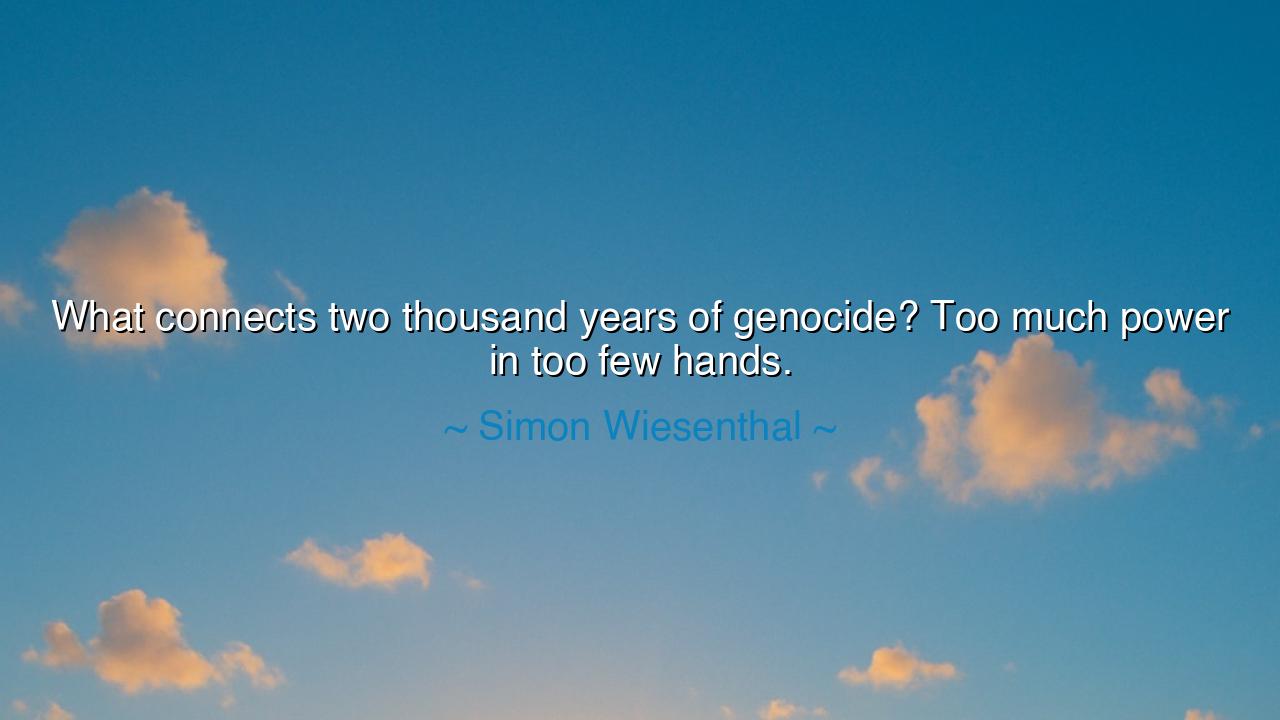
What connects two thousand years of genocide? Too much power in






In these words, Simon Wiesenthal, a man who dedicated his life to justice and the memory of the oppressed, reveals a truth that echoes through the ages. He speaks of the terrible thread that binds together countless acts of genocide across two thousand years of human history. That thread is the concentration of power—when too much power rests in too few hands, it breeds tyranny, oppression, and the destruction of entire peoples. His voice is not merely one of observation, but of warning, urging future generations to guard against this eternal danger.
The origin of this quote lies in Wiesenthal's own experience as a survivor of the Holocaust, one of the darkest chapters in human history. He witnessed firsthand how a single regime, led by a few men intoxicated by ideology and unchecked authority, could bring about the systematic slaughter of millions. Yet Wiesenthal's vision stretches beyond his own time. He reminds us that the same pattern has played out through centuries: from the Roman Empire's persecution of early Christians, to the Mongol conquests, to the Armenian genocide, and countless other tragedies. Though the names and places change, the root cause remains constant—power hoarded by the few, used against the many.
Consider the tale of the French Revolution. For centuries, the nobility and monarchy held nearly absolute control while the common people suffered in poverty and hunger. This imbalance of power ignited rage and despair, leading to violent upheaval and rivers of blood in the streets of Paris. Here we see another lesson: when power is not shared, destruction may come either from the oppressor’s hand or from the rebellion it provokes. The story of humanity is written again and again in this same tragic ink.
Wiesenthal’s words also speak to the fragility of freedom. Even in times of peace, vigilance is required. History shows that tyranny often rises slowly, cloaked in promises of order, safety, or prosperity. The Nazi regime began not with mass slaughter, but with subtle laws and quiet silencing of dissent. By the time the world awoke, the machinery of genocide was already in motion. Thus, Wiesenthal calls us to be ever watchful, to challenge any system where voices are silenced and power grows unchecked.
The lesson he imparts is not one of despair, but of responsibility. If genocide is born from too much power in too few hands, then the defense against it lies in unity, justice, and shared governance. Each generation must strive to balance the scales, to ensure that no ruler, no faction, no ideology gains dominion over the lives of countless others. Wiesenthal’s words are a torch passed down through the darkness of history, reminding us that though evil may rise, the people, if vigilant, may prevent it from reigning again.
Let these words be etched upon the hearts of those who lead and those who follow: power is a sacred trust, not a weapon. When it is spread among many, it can build civilizations; when it is gathered by the few, it can destroy them.






HALe Ha Anh
The quote by Wiesenthal is a profound reflection on the dangers of power. Throughout history, we’ve seen how a concentration of power leads to terrible outcomes, and it’s clear that the same patterns still emerge today. It raises an important question—how do we safeguard against the potential abuse of power in both government and society? What measures should we put in place to prevent history from repeating itself?
DMNguyen Duc Manh
Simon Wiesenthal’s quote is a stark reminder of the dark history we’ve lived through, and it points to the root cause of much of human suffering: the imbalance of power. Genocide and oppression are often the result of a few individuals or groups abusing their authority. How can we ensure that our political and social systems remain accountable? Can we find a way to truly prevent such a concentration of power from ever occurring again?
TDThuy Diem
This quote by Simon Wiesenthal speaks to the heart of systemic issues that have allowed atrocities to happen throughout history. The concentration of power in too few hands often leads to exploitation and violence. It makes me reflect on how we can ensure that power is distributed more equitably in society. Are we vigilant enough today to avoid repeating the mistakes of the past? What steps can we take to prevent this from happening again?
TDDu Thi Thuy Duy
Wiesenthal’s perspective is a powerful reminder of how history repeats itself when power is concentrated in the hands of a few. The idea of how unchecked power leads to violence and genocide resonates with the ongoing struggles in our modern world. Are we doing enough to ensure that power remains in the hands of the many, rather than a few individuals or groups? Can democracy truly safeguard against such dangers?
PNPhanh Nguyen
Simon Wiesenthal’s quote is both haunting and thought-provoking. It highlights the dangerous consequences of consolidating power in too few hands. Throughout history, we’ve seen how this centralization of power can lead to catastrophic events, including genocide. It makes me wonder, how can we prevent such a concentration of power in today's world? Can systems of checks and balances be enough to protect against the potential for abuse and violence?